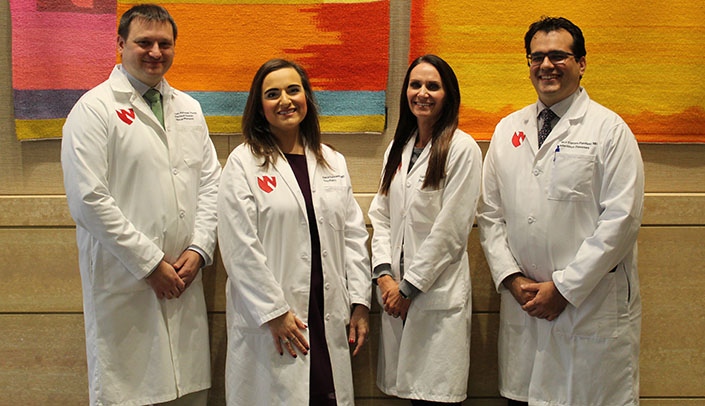Patients with serious infections requiring weeks-long antibiotic treatment are often sent home with a peripherally inserted central catheter, or a PICC line. However, this is not typically the case for patients with a history of intravenous drug use.
“Traditionally, physicians have been hesitant to use home IV antibiotics in patients who inject opioids and develop serious infections, citing clinical and medicolegal concerns about these patients using their IV lines to inject drugs,” said Nicolás Cortes-Penfield, M.D., assistant professor of infectious diseases.
And why is that?
“Stigma,” said Alëna Balasanova, M.D., assistant professor of psychiatry. “100 percent.”
Turns out, evidence instead shows that IV-opioid users can safely receive home antibiotics treatment — when paired with evidence-based medication assisted treatment (MAT) for opioid use disorder.
So, the medical and pharmacy directors of UNMC’s home IV antibiotic program, Dr. Cortes-Penfield and Bryan Alexander, Pharm.D., a Nebraska Medicine clinical pharmacist, respectively, reached out to UNMC’s addiction psychiatry team, led by Dr. Balasanova and VaKara Meyer Karre, M.D.
“It’s very exciting,” said Dr. Balasanova, “because it’s a historic collaboration.”
They came together to create an evidence-based protocol.
Other medical centers have pioneered a new model of integrated opioid use disorder and infectious disease care, wherein patients who develop infections from injection opioid use are treated with home IV therapy in combination with MAT for their substance use disorder. Now, this team wanted to bring this model to Nebraska, in order to use evidence, to best treat patients.
Making decisions based on stigma is not just mistaken — it can be harmful.
“Prejudice toward people with substance use disorders may lead us to offer them suboptimal treatment strategies, such as recommending prolonged hospitalization for IV antibiotics, which in our experience often leads these patients to leave against medical advice before finishing an adequate course of therapy,” Dr. Cortes-Penfield said.
But, said Dr. Balasanova, collaborative evidence-based strategies can result in effective treatment of both conditions. Properly treated, “Their substance use disorder can go into remission just like anything else,” she said.
“This strategy has been shown to help patients get and stay engaged with their care,” Dr. Cortes-Penfield said.
The team will work together with the Nebraska Medicine hospital teams to identify patients who have severe infections from injection opioid use who are candidates to be safely treated with home IV antibiotics and MAT for opioid use disorder.
“Our goal is to ensure we provide extraordinary care to our region’s most marginalized patients,” Dr. Balasanova said.
